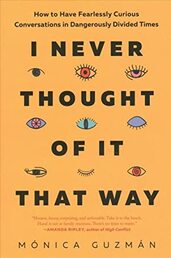 For me the best books make connections. Connections to other good books, ideas, and people. And, the best of these books also make me want to take action of some sort. In some cases, just the simple act of writing a review like this one. Mónica Guzmán’s book titled I Never Thought of it That Way is just such a book. It’s at times like this that I wish I had a larger platform on which to share the ideas she discusses in this book. It is the exact message we all need to hear right now and the insights and concrete steps we can use to begin talking to each other instead of talking at each other. Part of what makes talking to each other so difficult is that we have become isolated from the very people we’d most benefit from engaging with through what she refers to as sorting, othering, and siloing. We have become very good at sorting ourselves into groups according to our beliefs and social media makes this even easier. We view those who differ from us as some mysterious “other” who are so different from us that there is virtually no point in engaging with them. This sorting and othering lead us further into our own enclaves where we get all our information from those who already agree with us. These silos are more than simply echo chambers as they suck us down further into a hole that gets more and more difficult to get out of. For the remainder of this review, I’m going to share some quotes from the book which I find most compelling but really it is worth it to read the entire book. What I provide here is just a snapshot. “Harvard scholar Cass Sunstein found that on issues as diverse as gun control, the minimum wage, and environmental policy, people who talk to folks who share their positions both intensify those positions and want to take bigger, bolder steps to address them.” This very nicely explains why we continue to become more polarized. There’s a vicious cycle at work where our propensity to only listen to those who already agree with us makes our own views that much more extreme. This makes it less likely that we will listen to alternatives or consider views that differ from our own increasingly extreme views. “In her book The Happiness Hack my friend and neuroscience educator Ellen Petry Leanse explains what happens to your brain when you spend a lot of time with folks who reflect your own beliefs back to you. Basically, you stop thinking about those beliefs at all.” Once you stop thinking about your beliefs you stop thinking that they need to be examined. You no longer consider the possibility that those beliefs are not accurate representations of the world around you but simply filters through which you perceive reality. You no longer realize that any belief, no matter how well-founded is going to distort reality in some ways. “In one study of how federal judges make their calls in the courtroom, liberal judges'’ opinions moved to the left when they worked with other liberal judges, and conservative judges’ opinions moved to the right when they worked with other conservative judges. But when liberal and conservative judges worked together, that dampened their ideological tendencies. In both cases, what made the difference wasn’t exposure to information or education, but people.” This relates to the Sunstein point made above. While many liberals and conservatives might not see a problem with this, in reality when we don’t work with people who differ from us, our “solutions” become both more extreme and less viable. For most of our problems, the solutions will have to take some input from all sides in order to really work. Another key point here is what we can do to move closer together with people who differ from us. Exposure to information and arguments won’t do it. Those memes you share on social media won’t either. What can make the difference is simply spending time with people and learning about them. When you are faced with a claim that you disagree with, don’t rush in to refute it. Instead, ask questions like “What am I missing?” “As the legendary broadcast journalist Edward R. Murrow once quipped ‘Anyone who isn’t confused doesn’t really understand the situation.’” “The problem isn’t the partial answers we’re always collecting from a variety of sources in our busy lives. It’s the questions we stop asking because we think we’ve learned enough.” If you believe you already understand the issue and know what to do, it probably means that there is something you’re missing. It’s time to get curious and learn more than you think you need to know. What experiences have others lived through that brought them to a different perspective on this issue than me? “People are mysteries, not puzzles. This means we can never be sure about them. But we can always be curious.” Guzmán discusses Ian Leslie’s useful distinction between puzzles and mysteries. As Leslie points out in his book titled Curious, ”Mysteries are murkier; less neat. They pose questions that can't be answered definitively because the answers often depend on a highly complex and interrelated set of factors, both known and unknown.” There’s more to learn about people and their lives that can not only help us connect with them but understand where they are coming from on any given issue. “It would take trust. It would take struggle. And more than anything, it would take rejecting the certainty that any one of them has all the information they need.” We need the people who are different from us to really get at the truth about these issues. There are experiences we haven’t had that inform their outlook and we can benefit from learning about them. More reasoning doesn’t work to resolve conflict. Researched Jonathan Haidt and others have deduced “a funny little quirk in how we approach different kinds of ideas. When we encounter ideas that line up with our existing beliefs, we silently ask ourselves Can I believe it? We look at the evidence presented to us, consider it on the merits, and see if the points add up to a belief we can feel good about. When we encounter ideas that challenge our beliefs, though, we ask ourselves something else: Must I believe it? And when we ask Must I believe it? it means our intuition is resisting. “ We start to look for “one good reason–just one will do it– to dismiss the entire offending concept.” “When you feel you’ve won online, you’ve rarely changed anyone’s mind. Instead, you stand as the triumphant king of a lonely land smoldering with the ashes of people you’ve decimated with your words who are less likely than ever to ever listen to your side again.” This quote from Elizabeth Saunders illustrates an important point. As you prepare to post that perfect meme on social media which will really slam the other side ask yourself a question. Will doing this really build a bridge for communication or will it slowly chip away at another opportunity for listening? Social psychologist Shalom Schwartz studies human values. His research indicates that “there aren’t an infinite number of human values out there. There are only ten: stimulation, hedonism, achievement, power, benevolence, universalism, security, conformity, and self-direction.” Conflicts are often cast in terms of one side accusing the other of having no values at all. But, in reality conflicts usually arise as a result of different sides ordering theses values differently. “Neither is likely to see that the other is motivated by a different set of top-ranked values. And that’s how each of them will miss truly seeing the other: they will mistake a different ordering of values for an absence of the ones that they think matter most.” This gives rise to a common but mistaken belief that “If you’re not motivated by this thing I consider good, you must be against it.” “Every tough issue that divides and exhausts us–abortion, immigration, gun regulation, you name it–divides and exhausts us precisely because it puts some fundamentally good values into tension with one another. That tension reveals the most confounding thing of all-trade-offs. " What’s more is what she calls “the sucky part” which is that for most intractable issues, “we can’t neatly resolve this tension between values or the trade-offs they reveal.” The best we can do is to find a balance that works for now. Inevitably that balance will have to be re-examined many times in the future. That’s just the nature of how trade-offs among values work. “We all want to solve our problems for good. I meant who wouldn't? Seeing things from our own individual point of view, it can seem so darn possible. But as long as those problems sit on a fault line between fundamental values in tension with each other, and we live among people who (a) walk different paths, and (b) apply their values to problems in a different order (spoiler alert: both are always the case!), good solutions are going to be a lot more elusive than we think. We may each come up with a solution where the trade-offs seem perfectly acceptable…to us. But what about everyone else?” Ultimately, we have to be willing to reach out and really communicate with people. We need to become more curious about individuals not as representatives of a set of beliefs or political groups but as people who have their own set of life experiences that have led them to the outlook they currently have. Doing so means we will discover points of contact where we share values in common. We will also discover points where we differ in how we order those values that we share. We need to remember that we share values even though we might order them differently. And we need to recognize that these differences will always be there requiring us to make trade-offs if we’re ever going to address issues and problems in an effective way. This also means that we will never be done addressing these issues. We will always have to revisit them and continue making trade-offs to accommodate changes in the world we share and the values we share. As Guzmán puts it, when it comes to communicating with others we have to build bridges and maintain them even if we don’t always cross them. What counts is that the bridges are there and available when we’re ready to use them. This image is useful when it comes to posting on social media. Are those comments or memes you’re posting building bridges or tearing them down? You might not see an immediate benefit to bridge building but it is there and can make a difference. We have to stay curious as well which includes rejecting easy answers to difficult questions and embracing complexity. When we do these things we open ourselves to experiencing what she refers to as an INTOIT moment. These are the moments when we can bridge the gap between people who differ from us. We can really listen to them and learn from them. If we’re lucky we can experience a revelation of sorts and say “I never thought of it that way!” 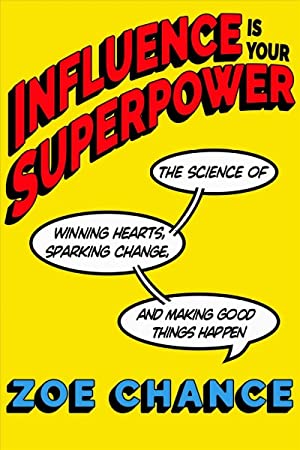 I teach courses in logic on a regular basis. Most any logic course presumes that reasoning is sometimes fallacious but that it is possible to improve your reasoning ability and as a result improve your decision making as well. In addition, by understanding how to evaluate arguments you can not only become better at spotting defective ones but also better at constructing them for yourself. In other words, studying logic will improve your power to influence. As it turns out, that view is wrong. Perhaps a better way to put it is that it’s an incomplete picture of our thinking and what you need to focus on to improve your influence. To learn what else you need to know, I highly recommend Zoe Chance’s new book Influence is Your Superpower: The Science of Winning Hearts, Sparking Change and Making Good Things Happen. As a logic professor, there are several points in the book that resonated with me that I want to focus on particularly in the second chapter titled Influence Doesn’t Work the Way You Think. She discusses Daniel Kahneman’s idea of two systems of thinking from his book Thinking Fast and Slow which he describes as “System 1” and “System 2.” She helpfully relabels these as the “Gator” and the “Judge.” The Gator “is responsible for every cognitive process that’s quick and requires negligible attention,” including things like emotions, quick judgments, and pattern recognition as well as any habitual behaviors. The label comes from the observation that much of a gator’s behavior is “habitual and relatively effortless.” That describes much of our thinking as well. The Judge “is responsible for every cognitive process requiring consternation and effort.” Things like planning, calculating, and the work my students do to solve proofs in symbolic logic. This is how we mostly view most of our thinking. We are sifting through facts and evidence and making judgments. What’s interesting is that while we tend to think that most of our decisions involve deliberate, rational thinking which would be done by the Judge, in reality, the Gator is responsible for much of our behavior and thinking, perhaps “up to 95 percent of our decisions and behaviors.” Understanding this point is key to understanding our own thinking and how to improve it. It’s also a crucial insight to improve your ability to influence others. Why would you want to do that? Well, as Daniel Pink pointed out in his book To Sell is Human, we are all in sales. Think about how much of what you do involves persuading and convincing others in some way. I know as a teacher I am trying to persuade my students to value the class material and learn it. In other words, I’m trying to influence them. So, if most of our thinking is done by the gator below the level of our “rational mind” does that mean influence amounts to manipulation? Not at all. Of course, some people do try to influence by using manipulation and she discusses how to deal with these tactics in her chapter titled Defense Against the Dark Arts. If our thinking is done by gators and judges then the manipulators are sharks “willing to bully, cheat, manipulate, and deceive people to get what they want.” But, that is not what she advocates in the book. Instead, she offers some simply useful tools to improve your ability to influence while building relationships with people. A good example of this is in her chapter on Charisma where she outlines two paradoxes of charisma. Trying to be charismatic has the opposite effect and the best way to attract other people’s attention is by giving them yours. An important key to influence is not manipulating people but connecting with them. The same goes for negotiations which most people see as an adversarial process where you’re trying to get something from someone else while keeping as much for yourself as possible. But, in reality, the best negotiations are collaborative and allow all parties to gain something. Doing this successfully involves asking the “Magic Question” which she describes as her favorite influence strategy. It’s one of my favorite from the book too. The question? “What would it take…?” Starting your question this way naturally invites the other person to think in terms of solving a problem together. It fits nicely with a point she makes earlier in the book. If you want “to become more influential just ask. Ask more often, ask more directly, and ask for more.” The worst outcome is that the other person will say no. But, you’ll be surprised how often people will say yes. Or at least meet you halfway. Sometimes, their answer will even exceed your expectations. But, you’ll never know until you ask. Most logic textbooks define the subject of logic as the science of evaluating arguments. An implicit part of this approach is that there is a distinction between the logical and the psychological. In fact, most logic textbooks will include a reference to the psychological in a chapter on logical fallacies which are mistakes people make in their reasoning process. The implication is that while these psychological tactics may be effective, they should not be used since they violate the principles of good critical thinking. Indeed, some psychological tactics do just that and should not be used. But, Zoe Chance’s book shows us that not all psychological insights are manipulative. To be a good critical thinker, you need to understand how your own thinking works. To have influence you need to understand how to connect with people in a genuine and authentic way. As a professor, her book has given me many useful insights that I will be integrating into my logic and critical thinking courses. As a musical artist, I think I can apply her insights to help my music reach a larger audience. As a human being, who wants to win hearts, spark change and make good things happen, this book will help me unlock my superpower to influence for the better. 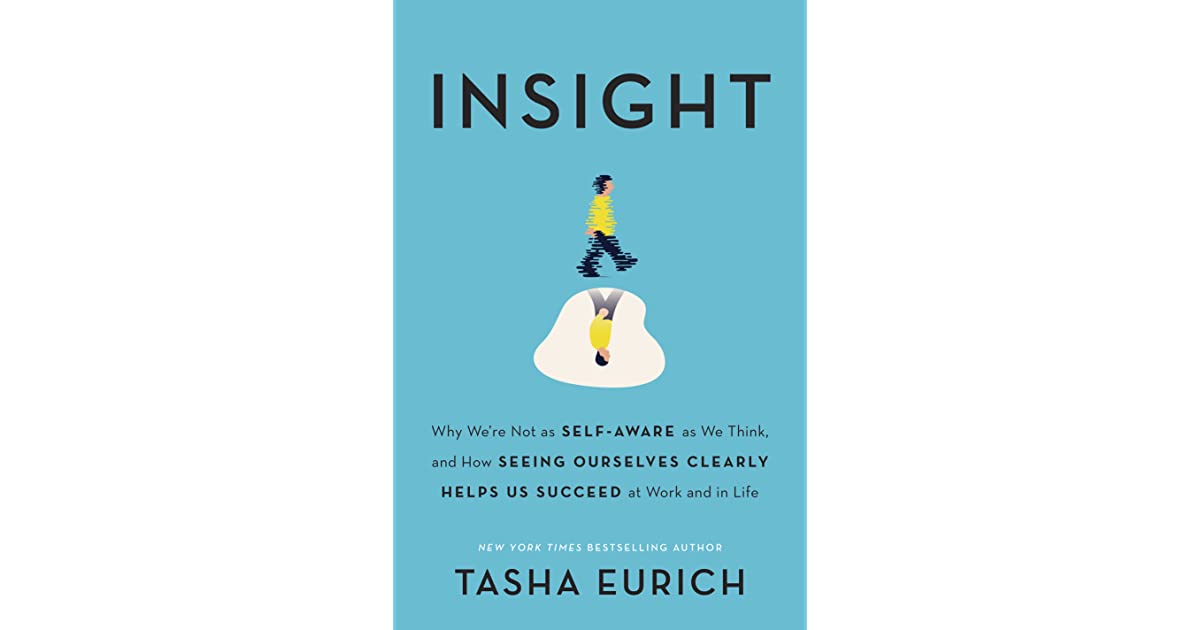
Tasha Eurich’s book titled Insight: Why We're Not as Self Aware as we Think, and How Seeing Ourselves Clearly Helps Us Succeed at Work and in Life is…well the only word for it is “insightful!”
But, achieving insight takes deliberate effort and does not come naturally. As she points out, “In the absence of a committed effort to build self-awareness, the average person makes only meager gains as they grow older.” And, you have to be willing to learn from failure as opposed to letting it paralyze you into inaction. To do this Adams gives some very useful tips to remember including:
"Goals are for losers. Systems are for winners." "Passion is bull. What you need is personal energy." "A combination of mediocre skills can make you surprisingly valuable."
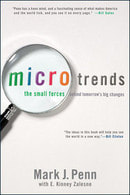 What social forces will have major impact in the next ten years? More than likely, whatever they are, there are already signs that they are at work changing our world. Since they are now small movements it is difficult to tell what effects they may have. More so since there are other small movements currently active which will come to naught. How can we distinguish the microtrends which will impact us from the ones that won't? One option is to study previous microtrends that, in fact, have led to major changes. That is the subject of Mark Penn's book Microtrends.
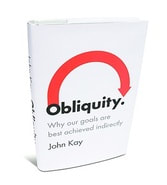 Being goal oriented is a popular virtue these days. There are innumerable websites promoting all sorts of methods to increase productivity, wealth, health, happiness, and so much more. The sometimes unstated, but more often over-stated, message of many of these resources is that we need to sit down, clearly define our goal, and march directly towards it. Our failure to achieve these goals is then attributed to our lack of focus, lack of drive, lack of persistence. But, what if our real failure is related to our attempt to achieve our goals directly? What if we shifted our focus away from our ultimate goals? Perhaps we would have better success in achieving them.
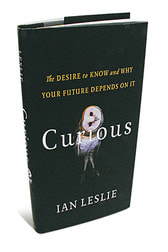 Curiosity. We see it brimming over in young children. Then it slowly wains. By the time these children reach the college classroom it has gone extinct in many of them. Sadly, the very thing that is supposed to be supporting our curiosity is a large factor in its decline: schooling. The focus on answers over questions drives out curiosity in favor of certainty. The fear of being wrong drives out curiosity in favor of certainty. The ubiquity of information drives out curiosity in favor of trivia. Ian Leslie's book does a good job of addressing not only the importance of curiosity but also why it declines and how to preserve it. As he points out "curiosity is vulnerable to benign neglect." It needs to be cultivated and supported. It is a habit that needs to be fostered by continued practice. Often we don't get that practice.
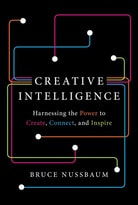 You've heard of IQ and maybe even EQ (emotional intelligence), but have you heard of CQ? Bruce Nussbaum argues that creative intelligence will be a key driver of economic growth and an important factor in individual success in the 21st century. In some respects his book joins a chorus of others making similar arguments. There was Dan Pink's Whole New Mind and Seth Godin's The Icarus Deception to name just two. Both argued for the importance of creativity in the work world. Nussbaum's book provides us with some concrete competencies that creative intelligence encompasses.
Many of these will not be surprising including continuing to learn, play, and make. But, for me anyway, hearing these arguments from different sources in different ways helps reinforce the point. 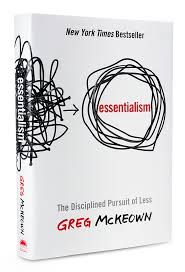 How often do we ask this important question: What is really essential in my life? Perhaps if we did ask this question more often we would find ways to reduce not only our stuff but also our stress. As Greg McKeown puts it "essentialism isn't about getting more done in less time. It's about getting only the right things done." Our world is filled with more choices, more social media platforms, more news outlets, more commitments, and seemingly less time to accomplish all we need to do. But, what if we began by examining what we "need to do" in terms of what is really essential? Getting to this point seems impossible but McKeown provides us with a clear roadmap and some practical advice for living as essentialists.
|
KEVIN J. BROWNEPhilosopher / Educator These blog posts contain links to products on Amazon.com. As an Amazon Associate I earn from qualifying purchases.
Categories
All
Archives
April 2023
|
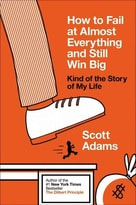
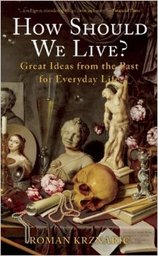



 RSS Feed
RSS Feed
















